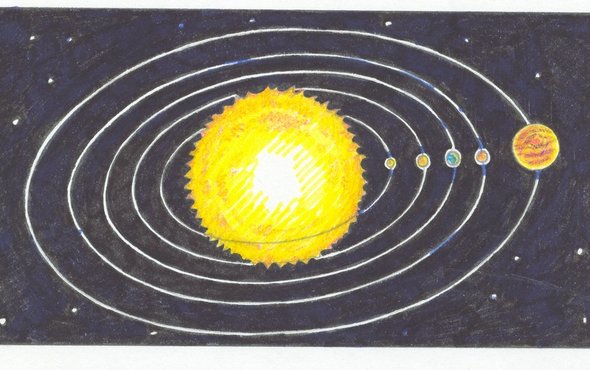(单词翻译:单击)
听力文本
This is Scientific American — 60-Second Science. I'm Christopher Intagliata.
The more astronomers study the heavens, the more they realize: our solar system is weird.
"There are a few things that make the solar system kind of strange." Lauren Weiss, an astrophysicist at the University of Montreal. "One of which is we have a giant planet. Only about 10 percent of sunlike stars have a giant planet. And there are probably even fewer that have two giant planets."
In addition to giant Jupiter and lesser giant Saturn, we have tiny Mercury—just a bit bigger than Earth's moon.
So if we're weird, what does a typical solar system look like? Weiss and her team trained their telescopes on 355 star systems known to host a handful of small exoplanets. And they found that most of the planets within individual star systems tended to be similar in size.

"So if I'm a planet, and I'm, say, two times the size of Earth, my neighbor, the next planet over, is also likely to be two times the size of Earth, give or take a little bit."
And they were strung out at similar distances from each other too...like peas in a pod, she says. Compared to that orderly array, our system looks more like, "Uh let's see, if I stick with food...I don't know...like a whole Thanksgiving dinner or something?"
The results are in The Astronomical Journal.
As for hunting for habitable worlds: "If we're trying to find an Earth-sized planet in the habitable zone"—not too close to the star but not too far away either—"and we find an Earth-sized planet closer in, it might be worthwhile to continue searching for planets around that star."
Because there might just be a few more peas in the pod.
Thanks for listening for Scientific American — 60-Second Science. I'm Christopher Intagliata.
参考译文
这里是科学美国人——60秒科学。我是克里斯托弗·因塔利亚塔。
天文学家对宇宙的研究越多就越意识到:我们的太阳系非常奇怪。
“有几件事让太阳系变得有些奇怪。”蒙特利尔大学的天体物理学家劳伦·韦斯说道。“其一,太阳系有一颗巨行星。在类似太阳的恒星中,只有约10%拥有巨行星。”拥有两颗巨行星的恒星可能更少。
除了巨大的木星和较小一些的土星之外,太阳系还有小型行星水星——其体积只比月亮稍大一些。
因此,如果我们的太阳系很奇怪,那典型的太阳系是什么样的呢?韦斯和团队用望远镜观察了355个星系,这些是已知拥有少量小型系外行星的星系。他们发现,独立星系中大多数行星的体积大小往往很相似。
“所以,如果我是一颗行星,体积是地球的两倍,那我旁边行星的体积很可能也是地球的两倍,误差只有一点儿。”
她说,这些行星排成一排,彼此之间的距离也相似,就像豆荚中的豌豆一样。与那种有序排列相比,我们的太阳系看起来更像是……“嗯,让我想想,如果用食物来形容……我不知道……可能就像完整的感恩节晚餐之类的吧?”
这项研究结果发表在《天文学期刊》上。
至于寻找宜居世界:“如果我们试图在宜居地带寻找地球大小的行星”,既不会离恒星太近也不会离得太远,“然后我们发现了与地球大小接近的行星,那可能继续搜寻其周围的行星是值得的。”
因为“豆荚”中可能有更多的“豌豆”。
谢谢大家收听科学美国人——60秒科学。我是克里斯托弗·因塔利亚塔。
译文为可可英语翻译,未经授权请勿转载!
重点讲解
重点讲解:
1. in addition to 另外;加之;除…之外;
例句:In addition to the psychological reasons that lead a person to deny his own mental illness, there may be a physiological one, as well.
除了心理方面的原因,导致患者否认病情的原因也有可能来自生理方面。
2. give or take 相差不到…;出入至多;
例句:They grow to a height of 12 ins — give or take a couple of inches.
它们会长到12英寸高——出入至多几英寸。
3. compared to 与…相比;和…比起来;
例句:The American style of education, compared to that of other countries, is quite informal.
美国式的教育跟别的国家比起来是相当不正式的。
4. as for 至于;
例句:As for the identity of the 75 guests, Prince Robert kept it a secret to the last.
至于75位来宾的身份,罗伯特王子则保密至最后一刻。


